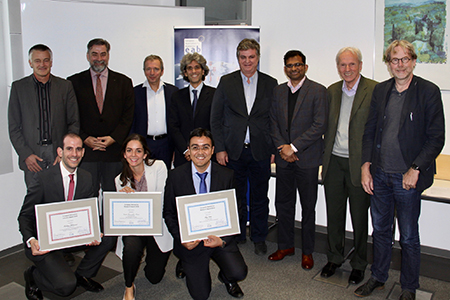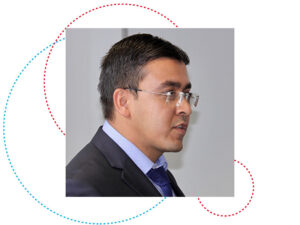Dr. Rig Das has won the European Association for Biometrics Research Award 2018 for his work on face recognition and finger vein-based biometric identification.
The prestigious award recognizes individuals who have made a significant contribution to the field of biometrics research in Europe. Das was one of only three finalists selected to present his work to a panel of some 22 leading academics and industry experts at the Fraunhofer Institute, Darmstadt, in September 2018. Exceptionally for this award, Das presented on contributions made to two areas of biometrics research, rather than one.
His work on facial recognition tackled the challenge of identifying key features regardless of facial expression. Existing methods work well in a controlled environment, but struggle to cope with everyday situations involving talking and laughter. Using a novel combination of heat mapping and Recurrent Neural Networks (RNNs) – a type of deep learning normally reserved for speech recognition – Das was able to improve upon the existing state-of-the-art by 54%.
“Using existing methods, you train the machine on a database with millions of portrait photos,” he explains. “But then in real life it can’t adapt what it knows to the sheer variety of expressions it encounters. Recurrent Neural Networks, however, have an internal memory so even if you present them with something new they will try to make sense of it in the context of what they know. The received wisdom is that RNNs aren’t suitable for work with images, but in this case they perform very well.”
Facial recognition is already in use for airport passport checks, but Das’ approach – which can cope even with facial obstruction from sunglasses and hats – opens up the possibility of more efficient and dynamic security processes.

Members of the jury with award winners Ruben Tolosana, Ester Gonzalez Sosa and Dr. Rig Das
For his work on finger vein-based identification, Das addressed issues resulting from the range of infrared scanners currently in use. “Companies are using both high and low-resolution scanners,” says Das. “Existing techniques, however, will only work for one or the other, because they capture different features. We used Deep Learning to develop a technique that works perfectly, irrespective of image quality.”
While many of us already use fingerprint recognition for accessing mobile phones and even computers, the technology isn’t widely trusted, because it is easy to trick. Blood vessel patterns, however, are unique and impossible to counterfeit, being both under the skin and constantly fluctuating with the flow of blood. Applications include credit card authentication and security for ATMs and cars.
Along with a prize of 2000€, Das received honorary membership of the European Association for Biometrics – a distinction he shares with only other winners of the award and the leading professors in the field. “It’s a very prestigious international award, and it took me three and a half years of extremely hard work to get it, so it’s very satisfying,” he says.
